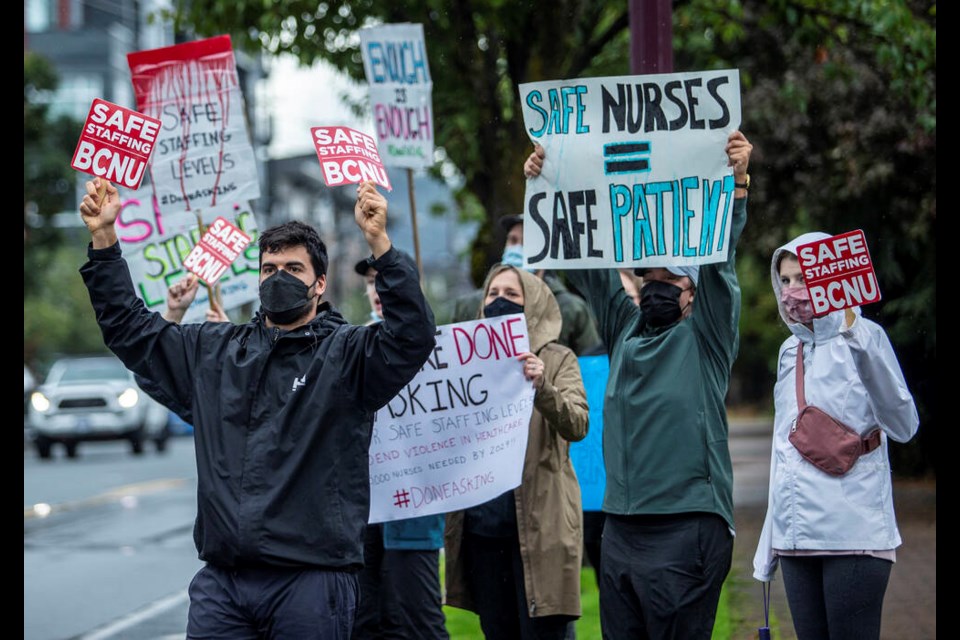Nurses rallied in front of the premier’s constituency office in Langford Friday to send the message that they are short-staffed, exhausted, overworked, at risk of violence and stressed due to relentless pressures that started before the pandemic.
About 150 or more nurses gathered outside Premier John Horgan’s office on Jacklin Road, then lined the street and waved signs as part of a national day of action by Canadian nurses and their supporters.
B.C. is in a staffing crisis for nurses, said Adriane Gear, registered nurse and lobbyist for the B.C. Nurses Union on the south Island.
A growing number of new nurses are leaving direct patient care or the profession due to the pressures they face daily, she said. They end up caring for more patients than they should and are not mentored or supported enough by experienced nurses.
Nurses nearing retirement are less likely to stay on, fearing that their physical and mental health will suffer because of the rigorous conditions, Gear said. That has led to an accelerated attrition rate, something the province needs to address, she said.
Not enough nurses are being trained, Gear said, adding the province needs to fund more seats at post-secondary institutions. The province estimates it will need 23,000 more nurses by 2029.
Once working, nurses need to be retained, she said. “The government really needs to work with the health authorities to ensure that our workplaces are safe and that they’re respectful.”
One way to address the shortage of nurses is to employ more newcomers to B.C., while maintaining the province’s high standards, Gear said. Trained as nurses in their home countries, they can face “overwhelming” costs to become certified in this province.
“We need to remove barriers for internationally educated nurses to become credentialed. That would go a long way.”
Nurses are frequently expected to work overtime on shifts, up to 16 hours and even longer, particularly in long-term care, she said. “You can’t just leave if there is no one to replace you.”
Nurses are also calling for more security in hospitals to stave off the risk of violence, Gear said.
In recent months, nurses have been spat on as they walked through protests by people angry that vaccination cards are now mandatory to access some non-essential businesses, such as restaurants.
Gear said a young nurse with a baby came to her on Friday and started crying, saying that she was leaving nursing. Gear urged her not to make a quick decision. “It broke my heart.”
Another nurse told Gear: “I sometimes get so anxious I cry on the way home because I feel sick that I’ve left the unit.”
Nurses are having to make decisions about whether to go home and get some sleep before their next night shift, or stay at work because staffing is so low, Gear said.
While health-care workers can rally in emergency situations, the public needs to understand that the pressure has become the norm, she said. “It is dire out there.”
Workloads are being doubled and tripled, leaving nurses already exhausted as the province goes through the fourth wave of the pandemic, she said.
cjwilson@timescolonist.com



